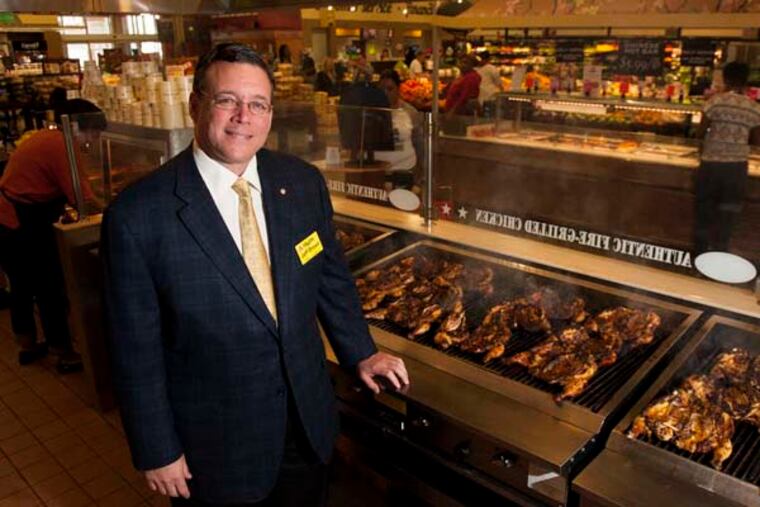
It's hard to resist when Jeffrey Brown, founder and chief executive of Brown's Super Stores, serves a slice of sweet potato bundt cake. Moist. Delicious.
"It's our own recipe," Brown said, "one of probably a thousand recipes we've developed."
Look on the outside of Brown's 11 supermarkets and the store sign reads ShopRite. Supermarket operators, who, like Brown, join the retailers' marketing and distribution cooperative, Wakefern Food Corp., use the ShopRite name and inventory, but they run their stores according to their own standards and product mix - including, at some of Brown's stores, sweet potato bundt cake.
"We're in North Philly, and a lot of our customers, if you follow their family's heritage, they came from the South and they have a Southern diet," said Brown, 51.
"So one of the things we're really interested in is people's lineage and their heritage and their religion. We get to know our communities, and we make stuff that's from the origins of where they come from."
Another example?
In our Island Avenue store, we have a lot of Western Africans and we have Western African items there.
Here in your Fox Street store in Philadelphia, I notice you have a big Halal butcher and deli section.
More than 10 years ago, I was with a group of our store managers, and we noticed that the Muslim women with the head coverings completely bypassed our meat department. I took all my managers down and I said [to one customer], 'Would you mind talking to us? We want to understand why you don't buy our meat.' She said, 'Oh, I'm Muslim and we only buy Halal meat.' The Quran tells what's lawful dietary guidelines and because yours isn't Halal, we don't buy it.'
Then what?
I said, 'Where could we learn more about it?' She said, 'I'll send you to my imam.'
You've opened stores in underserved inner-city neighborhoods.
The supermarket business model really counts on selling some stuff that you make more money on to compensate for stuff you lose money on or don't make a lot of money on. [But] the business model doesn't work as well in a lower-income area because of the mix of what people buy. They buy fewer high margin goods and more commodity goods.
Profit margin is obviously an issue. How about theft?
The first thing that comes to mind [with low margins is] they must have a theft problem. It turns out it's not a theft problem; it's a mix problem. Our lowest-income supermarkets and our highest-income ones have indistinguishable theft rates.
At this store, you have a health clinic, a pharmacy, a dietician, a social worker to help shoppers gain government entitlements, and a credit union. Don't they erode margins?
I think they're important amenities.
And the credit union?
This credit union is a fantastic proposition for our customers. You don't need to have a balance to have an account. So the first of the month you might have a balance. The end of the month you might not. You don't pay a monthly fee and there's no surcharge on the ATM. Basically, this solution ends all predatory [financial] behavior.
Very altruistic, but it's handy to have your customers, in your stores, with access to money.
Absolutely. They're always both in my mind. My customers in society and our business: How do we come up with something that works for all of us?
You've taken this expertise and started Uplift, a nonprofit to help businesses bring food into underserved communities.
It [takes] a combination of finance and public incentives, creativity, entrepreneurial efforts, and community engagement. Cities and nonprofits call Uplift. We assess their circumstances through a number of tools we've developed and come up with an action plan.
What's next for Brown's?
The big thing we're working on is entertainment. So you could have lunch or dinner and maybe listen to live jazz music, have a beer and a fire-grilled chicken. I'm thinking it's more reasonably priced, safe, fun. [And it's] not going to be in a corner bar where bad things happen.
215-854-2769
@JaneVonBergen